![]()
Contemporary American Paperweights for Sale
![]()
Contemporary American Paperweights for Sale
The glass paperweights on this page are by contemporary American makers. I am using it to list paperweights were I have only a few examples for sale by the maker. Be sure to check out my other pages for specific makers such as Charles Kaziun , St. Clair, Degenhart , and Gentile Glass.
There
is no shopping cart on this website. If you would like
to purchase any of these paperweights or need more
information, please send an email to:
aport@paperweights.com
| 6433 | Correia Buzzini Limited Edition Calla
Lilies Paperweight. dated 1983. This
paperweight features three lampwork calla lily flowers and plants
over a green spherical ground. The exterior is frosted and
the top is cut with an angled clear window. It is signed in
script on the base "Correia" and "1983 LIMITED EDITION P.WCLCL
22/100". The signature indicates that this is number 22 out
of a limited edition of 100 paperweights. Steven Valentine Correia received his bachelor of arts degree from the University of Hawaii in 1972. He earned a masters in art degree from UCLA and then a second masters degree in fine art from the University of Hawaii. He was drawn to sculpture and design. Steven founded Correia Art Glass in 1973, along with a business partner Roger Roland. It was one of the first privately owned art glass studios to spearhead the Art Glass Movement in the early 1970’s, creating a new American market for contemporary decorative arts. The company continued to operate under the artistic guidance of Steven Correia until 1987. The studio is located in Santa Monica, California and is currently operated by Steven Correia's sister and brother Algerine Correia and Jeffrey Correia. In 1987 Steven Correia left Correia Art Glass and founded Correia Crystal in Bethlehem, Pennsylvania where he focuses his attention on creating sculptural objects. He also has an interest in large-scale environmental kinetic light sculpture as well as his audio and visual performance art. Roger Roland withdrew from the partnership in 1975 and established his own independent Roland Art Glass studio in Ketchum, Idaho. Chris Buzzini studied at Shasta Junior College in Redding, CA and California State University at Chico, CA. While at Shasta, Chris was exposed to glassblowing for the first time by Chris Sowder (1970). Buzzini pursued glassblowing, eventually setting up his own “backyard” studio. From 1972 to 1975, Chris worked at Orient & Flume Art Glass in Chico, CA. Later from 1976 to 1978, he operated a glass studio Bridgeton Studios in New Jersey with the backing of a collector and a partner. Eventually he moved back to California and worked at Lundberg Studios and Correia Art Glass. While at Correia from 1983 to mid 1986, Chris created a line of lampwork paperweights with angled windows like the one featured in this listing. Since 1986 he has been an independent studio artist. His designs often sell for several thousand dollars.
Large size: 2 7/8" diameter by 2 1/2"
high. The base is polished flat. The design has a
frosted finish and an angled clear window on top. For extra pictures, click on the picture at the right and the following links: Large picture$125 postage paid in the US. Click on the picture to see a larger image. |
Click
on the picture to see a larger image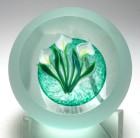 |
| 6294 | Magnum Glass Eye Studio 2005 Big Dipper
Paperweight. dated 2005. This
extra large paperweight features a stylized view of the Northern
Hemisphere sky view with eight especially bright stars. The
bright stars are are the seven stars that make up the big dipper
and a little way away, the North Star. The paperweight is
signed on the base "Big Dipper" and acid etched "GES 05". It
comes with the small display card shown in the pictures (2 11/16"
x 1 15/16"). A fascinating paperweight worthy of any
collection. This fun weight is part of the Celestial Series
of paperweight made by GES. Note: Please ignore the white areas, they are glare from the lights. Glass Eye Studio was founded in 1978 in Seattle, Washington. Managed by Dale Leman, GES is a production glass company that produces a range of glass products. Most paperweights are signed with the acid etched initials GES, although some are signed with the engraved Glass Eye Studio signature or even a signature cane. Each GES glass product includes some ash from the 1980 eruption of the nearby Mount St. Helens volcano. Extra large size: 3 1/4" diameter by just over 3
1/16" high. The base is polished flat. For extra pictures, click on the picture at the right and the following links: Large picture$135 postage paid in the US. Click on the picture to see a larger image. |
Click
on the picture to see a larger image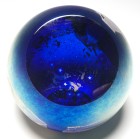 |
| 3705 | Early Magnum Kit Karbler Michael David
Blake Street Glass Art Nouveau Paperweight.
dated 1981. This is a very early art nouveau paperweight
made by Kit Karbler and David Michael of Blake Street Glass in
Denver, Colorado. It features a flowing organic motif in
shades of red. The design is placed near the base and
encased in clear glass. The paperweight is extra
large. It is signed on the base by both artists near the
edge of the base with the "1981" date in the center of the
base. An early example from this studio. Great
execution. Note about Blake Street Glass: This paperweight is a very early work by these outstanding glass artists and differs from their later sculptural work which evolved to a sophisticated process for cutting and faceting. Later works often sell for thousands of dollars. The price for this piece is more modest. Blake Street Glass in Denver, Colorado was started in 1979 by Kit Karbler and Michael David. The two set out to make works that were different with a sophisticated process of cutting and faceting the pieces. Their approach gained them numerous awards and recognition over the years. Their work is on display in many prestigious collections and museums. Kit Karbler received his Bachelors degree in Fine Art from Ohio University and continued his graduate studies in Glass and Design at UCLA where he studied with the internationally renowned glass artist Richard Marquis. Michael David studied Glass and Art at the University of Colorado, Goddard College and Cornell university. The Blake Street Glass Studio closed in 2020. Very large size: 3 11/16" diameter by 3 3/8"
high. The base is polished flat. The paperweight
weighs 2 pounds 5 ounces and will weigh over 3 pounds when
double boxed and packaged for mailing. For extra pictures, click on the picture at the right and the following links: Large picture$295 postage paid in the US. Click on the picture to see a larger image. |
Click
on the picture to see a larger image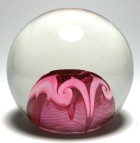 |
| 6077 | Rick Ayotte 1996 Robin with Almond
Flowers Miniature Paperweight. dated 1996. This
miniature paperweight depicts a European robin nestling in the
branches of a blossoming almond tree. It is signed "Ayotte
M-59 '96" on the side just below the middle of the
paperweight. A precious paperweight in excellent condition. This paperweight appears in the book Songs without Words: The Art of the Paperweight - Rick Ayotte. This paperweight is a miniature and is shown on page 145. The robin also appears in a full size compound paperweight "Springtime in Mallorca" (A290) shown on page 127. Roland "Rick" Ayotte specializes in paperweights with themes from nature, including lampworked bird and other animals, flowers, fruits, and berries. His paperweights range in size from miniatures to super magnums. He also produces other wonderful glass art objects. He lives and works in New Boston, New Hampshire and has been making glass paperweights since 1978. Miniature size: Just over 2 1/8" diameter by 1
7/16” high. The base is polished concave. For extra pictures, click on the picture at the right and the following links: Large picture$645 postage paid in the US. Click on the picture to see a larger image. |
Click
on the picture to see a larger image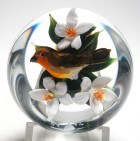 |
| 5278 | Very Early Francis Whittemore Miniature
Paperweight with White and Blue Millefiori Flowers on a Pink
Ground. circa 1962 - 1969. This very early
paperweight by Francis Whittemore features five small white
millefiori flowers with blue star centers. There is also a
stem and two green leaves. The design is placed on a powdery
pink ground. This paperweight is signed in the design with
an early Whittemore signature cane, a black "W" on a yellow
background. This is an important early example of
Francis Whittemore's work and worthy of any collection of
Whittemore paperweights. Note: This paperweight is almost the same as the examples offered in Larry Selman's first two editions of "CATALOGUE OF COLLECTORS' PAPERWEIGHTS". See the 1970 Catalog (robins egg blue cover) or the 1971 Catalog (olive green cover). Francis Dyer Whittemore, Jr. is considered one of the pioneers of the modern paperweight renaissance. He started working in glass in 1938, but did not start making paperweights until 1962. His studio was in Lansdale, Pennsylvania. Like many other early glass artists, Francis started his career as a scientific glass blower and then later taught glass as an instructor. For five years, he spent one month a year consulting at Baccarat to help them refine their lampwork paperweight art. Some sources have this consulting work from 1971 to 1976. Other sources have it starting later. The signature cane used on this paperweight was one he developed prior to working at Baccarat. Most of his paperweights are miniature to medium in size. You can read about Francis Whittemore in the book American Glass Paperweights and Their Makers by Jean Melvin (1970). Size: 2 3/8" diameter by 1 1/8" high. This paperweight has a very low profile. The base is flat with a concave center.Signature: Signed in the design with an early Whittemore signature cane. The cane has a black "W" on a yellow background. Condition: Excellent condition. No chips, cracks, or scratches found on inspection. There are many bubbles in the ground and a few striations in the glass. For extra pictures, click on the picture at the right and the following links: Large picture$165 postage paid in the US. Click on the picture to see a larger image. |
Click
on the picture to see a larger image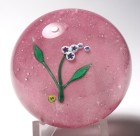 |
| 6178 | Magnum Cathy Richardson 2002 School of
Fish Compound Paperweight. dated 2002. This
three dimensional scene has three layers of fish intertwined and
swimming together. The top two schools are bright orange and
yellow. Below them is a darker layer, maybe predators or
maybe just shadows. The design is set over a dark blue
ground. It is signed "C RICHARDSON 2002" on the base.
The paperweight comes with a small information card about
Cathy. A wonderful paperweight. Note: A smaller example of this design sold recently at the LH Selman Auction 80 for $960 including the bidder's premium. Note on white glare: Please ignore the white areas, they are glare from the lights. Cathy Richardson was born in Washington D.C. and grew up in Falls Church, Virginia. She was always interested in art and nature and learned to draw and paint at a very early age. Her formal education was capped with a Ph.D. in geology from Harvard, University. In the 1980s she returned to art and built a stained glass studio in Iowa which she named "Nature's Image". In 1996, she studied lampworking with Bandhu Scott Dunham at the Corning School of Glass and in 1997 enrolled at Bowling Green State University and learned to blow glass. In 2000 she again studied lampworking at Corning School of Glass — this time with Shane Fero and Fred Birkhill. Her early appreciation of paperweights came from her mother who had a small collection of paperweights. She and her husband moved one more time to Winona, Minnesota in 1999 and she started a new studio named Touchstone Glass, making paperweights and marbles. Her earliest paperweights were made at the end of 2001 or early 2002. More recently she studied engraving and her latest works demonstrate an amazing ability to integrate traditional paperweights and an elaborate engraved surface. Touchstone Glass has grown into a family business, with Cathy's son, Colin Richardson, joining as a full-time glass artist in 2006, and Cathy's husband becoming one of the team when he retired from his University career. Colin now has his own studio in Minneapolis, MN. Very large size: 3 3/4" diameter by just over 3
3/8" high. The base is polished flat. This
paperweight weighs 2 1/2 pounds. Large picture$795 postage paid in the US. Click on the picture to see a larger image. |
Click
on the picture to see a larger image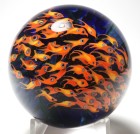 |
| 6152 | Fantastic Charles Kaziun Jr.
Checkerboard (Chequer) Millefiori Paperweight with Heart
Cane in center. circa 1960-1980. This is a
fantastic Charles Kaziun Jr. chequer millefiori paperweight with
nine millefiori canes spaced out and divided by a grid of gold
aventurine on a translucent pink ground. The central cane is
a wonderful heart cane. The paperweight is signed on
be base with Kaziun's gold foil "K". Kaziun chequer
paperweights are hard to find. This will make a wonderful
addition to any collection of Kaziun paperweights. Charles Kaziun Jr. was one of the most famous of the American paperweight artists. He is often credited with contributing to the rebirth of interest in paperweight making. He made paperweights from the 1940s until his death in 1992. His weights are usually signed with a gold K or a special millefiori cane containing a K. Charles Kaziun Jr.'s son, Charles Kaziun III is also a paperweight maker and signs his weight with a silver "K" on the base. You can read about Charles Kaziun Jr. in many books, including: Small size: Just over 2 1/8" diameter by just over
1 1/4" high. The base is ground concave. For extra pictures, click on the picture at the right and the following links: Large picture $795 postage paid in the US. Click on the picture to see a larger image. |
Click
on the picture to see a larger image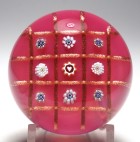 |
| 2187 | Miniature Red Crimp Rose Paperweight -
Unknown American Maker. This paperweight features a
tiny fifteen petal red crimp rose. The crimp pattern is
4+4+4+3 for a total of 15 petals. There are four green
leaves underneath. It is unsigned and I don't know who made
it. Three of the outer petals are missing some of the red
color and the underlying white shows instead. Two of the
green leaves are also missing some of their color. The
design is off center. There are bubbles in the glass.
Please read the description of condition below. The base is
polished flat so it appears that the maker must have thought it
was worth keeping even with its flaws. An important early
example for the collector of crimp rose paperweights. Crimp roses represent the ultimate challenge for paperweight makers. You can read about the crimps and their use in making crimp roses in the book American Glass Paperweights and Their Makers by Jean Melvin (1970). Note: Francis Whittemore, Robert Grablow, Charles Kaziun II, and others made similar crimp roses and used a 4+4+4+3 crimp pattern. Possibly it is an early Kaziun piece but I don't know for sure. It was found in Massachusetts. Miniature size: Just over 1 3/4" diameter by 1
9/16" high. The base is polished
flat. For extra pictures, click on the picture at the right and the following links: Large picture$195 postage paid in the US. Click on the picture to see a larger image. |
Click
on the picture to see a larger image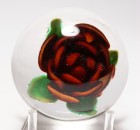 |
| 6437 | Henry Summa Iridescent Cone Paperweight
Sculpture. circa 1980-2000. This large
iridescent cone shaped paperweight sculpture features a
transparent blue-green twist weaving above and around an array of
controlled bubbles. The twist then travels below the richly
colored iridescent ground. I could not find a signature, but
other collectors provided a positive identification as the work or
Henry Summa. It is an intriguing design confined by the
conical shape. An interesting paperweight from a well known
New Mexico glass artist. Henry Summa (1949-2008) began working hot glass in 1972 as an apprentice with Glory Hole Glassworks in New Mexico. He then opened his first studio near Woodstock in upstate New York (1973-1974). After two years he moved his studio back to its permanent home in Santa Fe, New Mexico. Summa developed a series of faceted paperweights, sculptures, platters and vessels, some with extensive cutting and polishing.
Very large size: Just under 3 3/4" diameter at the
base by 2 7/8" high. The base is polished flat. For extra pictures, click on the picture at the right and the following links: Large picture$145 postage paid in the US. Click on the picture to see a larger image. |
Click
on the picture to see a larger image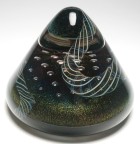 |
| 4064 | Orient & Flume Iridescent Figural
Pear Paperweight. circa 2003. Wonderful hand
crafted Orient & Flume pear paperweight having a stem and
leaf. The surface is has a light green iridescent
sheen. Signed on the base "Orient & Flume GQT3". A
wonderful example.
Orient & Flume was started in 1972 in Chico, California by Douglas Boyd and David Hopper. It studio took its name from its initial location which was at the corner of Orient & Flume. Their early weights adopted a style that has become known as the California style of iridescent paperweights with surface torchworked art nouveau motifs on the outside surface of the weight. Later work involved interior lampworked designs. Every Orient & Flume piece has a registration number which usually includes a date code. In this case, I believe the "G" is for 2003. Size: 2 9/16" diameter by just over 4 7/16" high
including the stem. The bottom has been ground flat.
For extra pictures, click on the picture at the right and the following links: Large picture$75 postage paid in the US. Click on the picture to see a larger image. |
Click
on the picture to see a larger image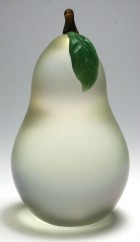 |
| 2312 | Large White Crimp Rose Faceted
Paperweight Stopper - Unknown American Maker. This
large paperweight stopper features a large white crimp rose.
The large white petals made it difficult to identify the crimp
pattern. It looks like a 4+3+3+2 pattern for a total of 12
petals. There are four green sepals or leaves
underneath. This rose stopper is faceted with one top facet
and 12 side facets in three rows. It is unsigned and I don't
know who made it. An important early example for the
collector of crimp rose paperweights. Crimp roses represent the ultimate challenge for paperweight makers. You can read about the crimps and their use in making crimp roses in the book American Glass Paperweights and Their Makers by Jean Melvin (1970). Large size: Approximately 2 1/4" diameter by 4
11/16" long. There is one top facet and 12 side facets in
three rows. For extra pictures, click on the picture at the right and the following links: Large picture$95 postage paid in the US. Click on the picture to see a larger image. |
Click
on the picture to see a larger image |
| 6193 | Great Early Robert Eickholt Translucent
Paperweight. dated 1984. This
paperweight consists of a multi-layered swirling design of
transparent pale gold and clear colored glass. It shows the
early adoption of veiling techniques by Robert Eickholt.
This is an early Robert Eickholt paperweight and is signed on the
base "Eickholt 1984". A stunning paperweight with great
color and iridescence. This paperweight has a translucent design was difficult to photograph. It has paperweight has a "veil" effect created by using a metallic powder in the glass. The veiling technique was first developed by Dominic Labino back in the early 1970s. Later it was used by Harvey Littleton (1980) and Ed Nesteruk in 1982. By 1980, Eickholt also adopted the technique. Michael O'Keefe adopted the technique a little later. Robert Eickholt (born 1947)
studied glassblowing in Berkeley, California, Ohio State, and
at the Columbus College of Art and Design. He has been
making glass paperweights since 1978 when he founded Eickholt
Glass in Columbus, Ohio. His designs often make use of
precious metals such as gold and silver, and rare oxides such
as cobalt and copper. In later years, Eickholt
experimented with other methods to add texture to the interior
design. He retired in 2013, but still creates beautiful glass on a
part time basis. Large size: 3" diameter by just over 3 1/4"
high. The base is ground flat. For extra pictures, click on the picture at the right and the following links: Large picture$69 postage paid in the US. Click on the picture to see a larger image. |
Click
on the picture to see a larger image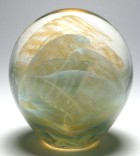 |
| 4693 | Charles Kaziun
Jr. Miniature Pink Sandwich Rose Tilted Pedestal Paperweight
with Torsade. circa 1960-1980. This is a
marvelous miniature tilted pedestal paperweight with pink sandwich
rose and an outer white twist torsade. The rose has three
sepals, two longer leaves and a green stem. At the base of
the stem is bit of aventurine, perhaps intended as a ribbon.
The design is set on an opaque aqua ground. The paperweight
is tilted at a 45 degree angle so it displays beautifully.
Signed on the underside of the ground with a gold foil K. A
great addition to any collection of Kaziun paperweights. Kaziun called this style of rose a Sandwich rose. He was inspired by the tiny roses found in antique basket of roses paperweights made by the Boston & Sandwich Glass Company. It is also called a rope rose. The rose is made with a tiny molten glass rod. Note: Please note that this is slightly larger
than the typical Kaziun #1. I have been referring to this
size as a #2. Charles Kaziun Jr. was one of the most famous of the American paperweight artists. He is often credited with contributing to the rebirth of interest in paperweight making. He made paperweights from the 1940s until his death in 1992. His weights are usually signed with a gold K or a special millefiori cane containing a K. You can read about him in many books, including: Signature: Signed on the underside of the aqua ground with Kaziun's gold K. Condition: Excellent condition with no chips or cracks. For extra pictures, click on the picture at the right and the following links: Large picture$375 postage paid in the US. Click on the picture to see a larger image. |
Click
on the picture to see a larger image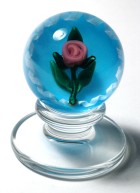 |
| 6046 | Large 1983 Orient & Flume Bruce
Sillars Daffodils Paperweight. dated 1983. This
wonderful paperweight features two delicate surface decorated
daffodils with green foliage on a black ground. "Orient
& Flume 56D1983 B. Sillars". It also has a rare Orient
& Flume signature cane "OF 83". This paperweight can be
viewed as a transitional work to more three dimensional lampwork
as Sillars made the this design in a flat motif (offered here) and
as a true three dimensional lampwork motif in 1983. A
wonderful paperweight. Note: This was a very difficult paperweight to photograph due to its highly reflective surface which highlighted every dust particle in my work area and included my camera in some of the pictures. Orient & Flume was started in 1972 in Chico, California by Douglas Boyd and David Hopper. It studio took its name from its initial location which was at the corner of Orient & Flume. Their early weights adopted a style that has become known as the California style of iridescent paperweights with surface torchworked art nouveau motifs on the outside surface of the weight. Later work involved interior lampworked designs such as the floral design found encased here. Every Orient & Flume piece has a registration number which usually includes a date code. Douglas Boyd passed away in 2018. David Hopper and his wife Shari retired to nearby Paradise California. They survived the wildfire that destroyed most of Paradise in 2018. Orient & Flume continues in Chico with new owners Bruce Sillars and Ronda Davis. Bruce was one of the original Orient and Flume artists and Ronda has spent the last 30 years at the studio handling sales and other responsibilities. They are joined by another early O&F artist Scott Beyers. Bruce Sillars was the first
employee hired by Orient & Flume and is still at O&F
today. Since
1973 Bruce has been responsible for many of Orient &
Flume's most successful designs. He grew up in
the Los Angeles suburbs and worked in ceramics in High School,
later becoming a technician in the ceramic studio at Moorpark
College. Sillars shifted
from ceramics at Chico State University to metal and sculpting
to glass blowing, earning a BA in Art with
an emphasis in ceramics, glass, and sculpture from California
State University, Chico. In the beginning he created iridescent vases and paperweights that
incorporated both geometric and naturalistic floral motifs.
Over time the designs became more and more complex and
sophisticated and by the early 80's his work began to move
away from iridescent glass focusing on three-dimensional
motifs and employing both "torch worked" and "lamp worked"
design elements. Large size: Just under 3 1/8" diameter by2 5/8"
high. The base is polished flat. For extra pictures, click on the picture at the right and the following links: Large picture$185 postage paid in the US. Click on the picture to see a larger image. |
Click
on the picture to see a larger image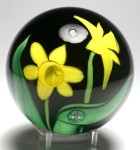 |
| 6439 | Colorful Rollin Karg Swirl
Paperweight. circa 1983-2000. This is an
interesting swirl paperweight made with green, yellow, and white
glass stringers . It is signed "KARG" on the side near the
base. A fun paperweight.
Rollin Karg spent the first part of his career as an industrial engineer, photographer, potter and woodworker before becoming a full time glass artist in 1983. He studied hot glass at Emporia State University (Kansas) and built his first glassblowing furnace there. Today he owns a studio and gallery in Kechi, Kansas. Size: 2 3/4" diameter by 2 7/16" tall. The
base is ground flat with a matte finish. For extra pictures, click on the picture at the right and the following links: Large picture$39 postage paid in the US. Click on the picture to see a larger image. |
Click
on the picture to see a larger image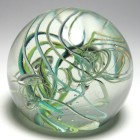 |
| 5383 | Rare Harold J. Hacker Snake
Paperweight. circa 1966 - 1980. This
wonderful Harold Hacker lampwork snake paperweight. The long
brown snake with two white eyes and a long slender tongue has a
yellow stripe down its back. It blends perfectly with the
copper colored frit ground. It is engraved "HJH" on the
base. A very similar example is shown on page 172 of
Melvin's book American Glass Paperweights and their Makers
(Revised 1970). A desirable example of Hacker's work. Harold James Hacker (1906 - 1989)
was born in Weston, West Virginia and, at the age of thirteen,
took a job at the Weston Glass Plant. Later he worked at
the West Virginia Specialty Glass Company and learned some of
the rudiments of blowing glass. In 1936 he moved to
California and worked at the Technical Glass Company in Los
Angeles. After service in the armed services during
world war II, he obtained a concession at the Knott's Berry
Farm making miniature glass objects, built on a hobby of
lampworking that started back in West Virginia. In 1966
Hacker and a friend from West Virginia, A. F. Carpenter,
started experimenting with glass paperweights at a small
studio near Hacker's home in Buena Park, CA. In the
beginning they made more traditional lampwork floral
arrangements and millefiori paperweights, but then focused on
lampwork snakes, reptiles, turtles, and other animals.
Their output was low and, even with two helpers, never
exceeded 200 paperweights a year. All were signed with
variations of Hacker's signature, "Hacker", "Harold Hacker",
"Harold J Hacker", or just the initials "HJH". It is not
possible to specifically identify which lampwork animals were
made by A. F. Carpenter, but it is believed that Carpenter was
the better lampwork artist and Hacker did some of the simpler
designs. Hacker also did the encasement. Their
work was considered good enough to earn an entry in
Dunlop's Dictionary of Glass Paperweights. Both
men are included in Jean Melvin's book American Glass
Paperweights and their Makers (revised edition 1970) and
Hacker has a page in Larry Selman's All About Paperweights.
Harold Hacker wrote an article "The Art of Paperweights"
for the 1968 Annual Bulletin of the Paperweight Collectors'
Association. Size: 2 3/4" diameter by 1 1/16" high. The
base is ground flat. Note the low profile. For extra pictures, click on the picture at the right and the following links: Large picture$165 postage paid in the US. Click on the picture to see a larger image. |
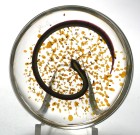 |
| 4382 | Robert Banford Blue Double
Clematis with Buds Double Overlay Faceted Paperweight with Fancy
Base Cutting. circa 1987. This
paperweight features a wonderful dark blue double clematis with a
yellow center and two companion buds, one open and the other still
closed. It is has many green leaves and a stem. The
design is set on a clear ground and encased with a brilliant red
and white double overlay. It is faceted with a large top
facet and six side facets. In addition there is a fancy
cutting on the lower portion below the facets. The
paperweight is signed with Bob Banfords “B” signature cane at the
tip of the stem. I believe this is part of Bob Banford's
1987 Collection and the cutting is by Ed Poore. A very
desirable addition to any collection of contemporary American
paperweights.
Note on condition: There is a 1/8" nick or tool mark just above the fancy cutting. It is barely visible, but I mention this for completeness and provide a much magnified picture. No other flaws found on inspection. Robert Banford worked in Hammonton, NJ. He started making paperweights in 1971 along with his father, Ray Banford. Bob continued to make paperweights until 2006. Bob and Ray did not date their paperweights, but it is sometimes possible to get an idea of when a paperweight was made by the progression of styles and the type of glass used. Bob Banford used a signature cane with a red "B" and a blue surround. Ray Banford used a different signature cane with a black B. Ray passed away in 2003.
Size: 2 15/16" diameter by just over 2 1/8"
high. The bottom is ground slightly concave. It is
faceted with a large top facet and six side facets. In
addition there is a fancy cutting on the lower portion below the
facets. For extra pictures, click on the picture at the right and the following links: Large picture$950 postage paid in the US. US Sales only, no international shipping. Click on the picture to see a larger image. |
Click on the picture
to see a larger image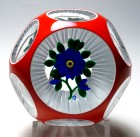 |
| 5362 | Robert Banford Blue Clematis with
Buds and Dragonfly Paperweight. circa 1980.
This compound paperweight features a wonderful large dragonfly
hovering above a striped blue clematis. The clematis has a
yellow center and two buds in various states of opening.
There are many green leaves and a stem. The design is set in
clear crystal with an opaque white ground at the base of the
paperweight. The paperweight is compound with the two levels
above the ground layer. The flower floats in the middle
layer and the dragonfly hovers above the flower. The
paperweight is signed with Bob Banford's “B” signature cane at the
tip of the stem. A very desirable addition to any collection
of contemporary American paperweights. Note: The bright light used to take the pictures exaggerate the refractive lines where the layers of glass are joined. This is normal in compound paperweights that use high quality glass. Note 2: There is a 3/16" flaw near the base of this of the paperweight. I'm not sure what caused this. It is not a chip or crack. Robert Banford worked in Hammonton, NJ. He started making paperweights in 1971 along with his father, Ray Banford. Bob continued to make paperweights until 2006. Bob and Ray did not date their paperweights, but it is sometimes possible to get an idea of when a paperweight was made by the progression of styles and the type of glass used. Bob Banford used a signature cane with a red "B" and a blue surround. Ray Banford used a different signature cane with a black B. Ray passed away in 2003.
Large size: 2 3/4" diameter by just over 2 5/16"
high. The white base is polished flat. For extra pictures, click on the picture at the right and the following links: Large picture$345 postage paid in the US. Click on the picture to see a larger image. |
Click
on the picture to see a larger image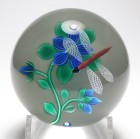 |
| 4968 | Early Magnum Kenyon Brown 1991 Green
Swirl Paperweight. dated 1991. This very large
paperweight features a green swirl design set on a clear spherical
ground. Ken created this paperweight by first taking a
gather of clear glass and shaping it into roughly a ball. He
then decorated the clear center with green stringers and encased
the finished design. It is signed with an engraved "Kenyon
Brown 1991" on the side near the fire finished base. One of
Ken Brown's earliest paperweights. A rare item. Note: There is some crazing in the glass near the signature. This is visible in the enlarged picture of the signature, but not obvious to the naked eye. Kenyon Brown was originally an auctioneer in Buckingham, PA. After his retirement he developed an interest in glass and volunteered at Wheaton Village (now WheatonArts) in Millville, NJ. He experimented for more than a decade making paperweights. While he did some of the setups at his home in Lahaska, PA, he would do the encasement in the hot shop at Wheaton Village. Ken passed away in 2017 at the age of 94. Wheaton Village (now called the Wheaton Arts and Cultural Center or WheatonArts) was founded in 1968 in Millville, NJ. It is non-profit arts education organization with a focus on the medium of glass. The center's mission is to engage artists and audiences in an evolving exploration of creativity. Many paperweight collectors and artists have visited Wheaton Village to participate in the biennial Paperweight Fest. The village hosts a variety of crafts studios including a The Glass Studio. It also houses the Museum of American Glass - a comprehensive collection of glass produced in America. Over the years a number of volunteers and paid glass workers have produced paperweights at Wheaton Village. Some of the names are Henry Davis, Kenyon Brown, Anthony “Tony” DePalma, and others. When the work was production work for The Glass Studio, it usually had a superimposed WV or WHEATON VILLAGE pontil stamp. Work that represented the artist's own effort would have additional initials to identify the artist. Very large size: 3 1/4” diameter by just over 2
7/8" high. The base is fire finished. For extra pictures, click on the picture at the right and the following links: Large picture$39 postage paid in the US. Click on the picture to see a larger image. |
Click
on the picture to see a larger image 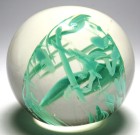 |
| 5227 | Charles Kaziun Jr. Miniature Tilted
Pedestal White Spider Lily Paperweight with Cobalt Blue
Aventurine Ground. circa 1960-1980. This is a
miniature pedestal paperweight with a white spider lily and four
green leaves on an opaque cobalt blue aventurine ground. The
flower has a six sided yellow millefiori center with a red flare
over each petal. Each leaf is a double leaf - two leaves
with a clear layer joining them so a bit of the ground shows
through. This makes it look like each leaf has an aventurine
stripe down the center. The aventurine ground is set on a
cobalt blue under-layer. The paperweight is tilted at a 45
degree angle so it displays beautifully. Signed on the white
underside of the ground with a gold K. A great addition to
any collection of Kaziun paperweights. Note: Please note that the base on this
paperweight is slightly larger than the typical Kaziun #1. Charles Kaziun Jr. was one of the most famous of the American paperweight artists. He is often credited with contributing to the rebirth of interest in paperweight making. He made paperweights from the 1940s until his death in 1992. His weights are usually signed with a gold K or a special millefiori cane containing a K. You can read about him in many books, including:
Signature: Signed on the underside of the blue ground with Kaziun's gold K. Condition: Excellent condition with no chips, cracks, or scratches found on inspection. For extra pictures, click on the picture at the right and the following links: Large picture$295 postage paid in the US. Click on the picture to see a larger image. |
Click
on the picture to see a larger image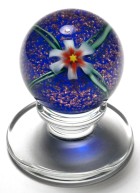 |
| 5277 | Very Early Francis Whittemore Miniature
Yellow Lampwork Flower with Pink Ground Paperweight.
circa 1962 - 1969. This very early paperweight by Francis
Whittemore features a six petal yellow flower with two green
leaves and a stem. It is signed in the design with an early
Whittemore signature cane. The cane has a black "W" on a
yellow background. The design is placed on a pink
ground. It is an important early example of Francis
Whittemore's work and worthy of any collection of Whittemore
paperweights. Note: This lampwork flower paperweight is similar to the millefiori type examples with the same frit ground offered in Larry Selman's first two editions of "CATALOGUE OF COLLECTORS' PAPERWEIGHTS". See the 1970 Catalog (robins egg blue cover) or the 1971 Catalog (olive green cover). Francis Dyer Whittemore, Jr. is considered one of the pioneers of the modern paperweight renaissance. He started working in glass in 1938, but did not start making paperweights until 1962. His studio was in Lansdale, Pennsylvania. Like many other early glass artists, Francis started his career as a scientific glass blower and then later taught glass as an instructor. For five years, he spent one month a year consulting at Baccarat to help them refine their lampwork paperweight art. Some sources have this consulting work from 1971 to 1976. Other sources have it starting later. The signature cane used on this paperweight was one he developed prior to working at Baccarat. Most of his paperweights are miniature to medium in size. You can read about Francis Whittemore in the book American Glass Paperweights and Their Makers by Jean Melvin (1970). Size: 2 5/16" diameter by 1 3/16" high. This paperweight has a very low profile. The base is polished concave.Signature: Signed in the design with an early Whittemore signature cane. The cane has a black "W" on a yellow background. Condition: Excellent condition. No chips, cracks, or scratches found on inspection. For extra pictures, click on the picture at the right and the following links: Large picture$195 postage paid in the US. Click on the picture to see a larger image. |
Click
on the picture to see a larger image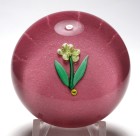 |
| 5159 | Robert Eickholt 1993 Magnum Blue
Iridescent Abstract Paperweight. dated
1993. This paperweight has an abstract design with a
deceptive three dimensional design. Unlike other works where
the peaks and valleys are physical, in this paperweight the peaks
and valleys are created using the veiling technique. The
dark blue inner core has a mostly smooth surface with only a few
depressions to anchor the larger bubbles. Additional texture
and depth are the result of adding transparent and translucent
layers to blanket the core. Two large bubbles and an arc of
smaller bubbles add to the magic. The iridescent colors
progress in layers in shades of light to dark blue. It is
signed "Eickholt 1993 EMAS" on the base. An excellent large
example of Eickholt's work. Note: Please ignore the white areas, they are glare from the light. Robert Eickholt has been making glass paperweights since 1978 when he founded Eickholt Glass in Columbus, Ohio. His designs often make use of precious metals such as gold and silver, and rare oxides such as cobalt and copper. In later paperweights by Eickholt the design moved to the interior and veiling techniques began to appear. He retired in 2013. Very Large Size: 5 9/16" tall by 3 3/16"
diameter. The base has been ground flat. For extra pictures, click on the picture at the right and the following links: Large picture$195 postage paid in the US. Click on the picture to see a larger image. |
Click
on the picture to see a larger image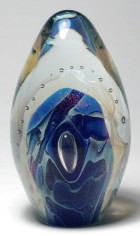 |
| 600 | Early Mark Matthews 1981 Experimental
Spiral Paperweight. dated 1981. This is an early
Mark Matthews Translucent Swirl Paperweight. It features a
precise gold swirl applied to a dark brown or dark red
surface. It was made in 1981 before Mark started his studio
in 1985, so it may have been made during his student days. I
have labeled this as an experimental piece because there are many
surface "flaws". These flaws don't appear to be damage but
rather the result of an unfinished or experimental process.
Marble collectors are familiar with this amazing artist but he
made relatively few paperweights. His focus is spheres and
some of them sell for thousands of dollars. This is a chance
to own an early Mark Matthews work. Mark Matthews started working in glass in 1974 while he was still an undergraduate at glorious Kent State University and continued his studies at Ohio University, receiving an MFA. Since 1985 he as worked full time in glass as an independent glass artist with his studio located within the Sauder Village in Archbold, Ohio. Matthews has become internationally recognized for his mastery of the glass sphere. His stated goal is to explore the ways radically different designs and techniques can be used within a well-defined category such as spheres. Mark Matthews work has been published in many books and is held in museums such as the Victoria & Albert Museum in London, England, the Corning Museum of Glass in New York, the Toledo Museum of Art in Ohio and the National Museum of American Art, Smithsonian Institution, Washington, D.C. Large Size: Just under 3 1/16" diameter by 2 7/16"
high. The base is unfinished with a broken pontil
scar. For extra pictures, click on the picture at the right and the following links: Large picture$395 postage paid in the US. Click on the picture to see a larger image. |
Click
on the picture to see a larger image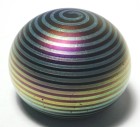 |
| 4646 | Magnum Victor Trabucco Pink Clematis
Paperweight with Buds on Trellis. dated 1983.
This Victor Trabucco paperweight consists of a large pink clematis
with two buds and leaves and stems on a white trellis. The
clematis flower has five textured petals with dark bushy stamens
in the center. One bud is about to open. There are ten
veined leaves. The design is set on a clear ground. It
is signed on the side near the base "Trabucco 1983". There
is also a "VT" signature cane on the underside of a leaf. A
beautiful paperweight.
Victor Trabucco's original career
was as a steelworker. He began working with glass in
1974 after seeing a flameworker make a sculpture. He knew this
was what he wanted to do for his life's work. Trabucco says
that “Glass is the ultimate challenge; it has properties of no
other material and offers the artist possibilities that are
inspiring for the creative process. His work is often inspired
by nature, capturing the beauty and motion of the subject and
freezing a moment in time. His work is in the collection of
many major museums. Victor set up his first studio in
the basement of his house and learned by
experimentation. He now works with his sons Jon and
David in a large studio in Clarence, NY. Very Large Size: Just over 3 1/8" diameter
by 2 1/2" high. The base is ground concave. For extra pictures, click on the picture at the right and the following links: Large pictureNew Price $450 (was $675) postage paid in the US. Click on the picture to see a larger image. |
Click
on the picture to see a larger image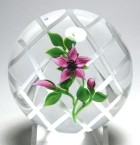 |
| 5265 | Francis Whittemore Miniature Yellow
Pears with Leaves and Seed Pod Paperweight. circa 1971
- 1980. This paperweight features two yellow pears along
with three green leaves, and a seed pod. It is signed in the
design with a fancy Whittemore "W" compound signature cane.
The signature cane is a white "W" on a blue background surrounded
by a ring of white stars. The design is placed on a
translucent green ground. Whittemore revisited this theme
several times during his career as a paperweight maker. A
beautiful example. Note: This was a difficult paperweight to photograph. The highly reflective surface even picked up a reflection of my hand and my camera. If you need more pictures please let me know. Francis Dyer Whittemore, Jr. is considered one of the pioneers of the modern paperweight renaissance. He started working in glass in 1938, but did not start making paperweights until 1962. His studio was in Lansdale, Pennsylvania. Like many other early glass artists, Francis started his career as a scientific glass blower and then later taught glass as an instructor. For five years, he spent one month a year consulting at Baccarat to help them refine their lampwork paperweight art. Some sources have this consulting work from 1971 to 1976. Other sources have it starting later. The signature cane used on this paperweight was one he developed during the period that he was consulting at Baccarat. Most of his paperweights are miniature to medium in size. You can read about Francis Whittemore in the book American Glass Paperweights and Their Makers by Jean Melvin (1970). Miniature size: Just under 2 1/16"
diameter by 1 11/16" high. The bottom is ground concave. For extra pictures, click on the picture at the right and the following links: Large pictureSOLD. Click on the picture to see a larger image. |
Click
on the picture to see a larger image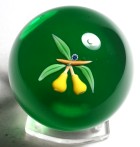 |
| 5690 | Great Early Robert Eickholt Translucent
Double Hearts Paperweight. Circa 1981. This
surface decorated paperweight consists of a hearts and vines
design with two hearts on the surface of a translucent gold
colored paperweight. This is an early Robert Eickholt
paperweight and is signed on the bottom "R. Eickholt 1981".
Eickholt called this design "Double Hearts." Robert Eickholt has been making glass paperweights since 1978 when he founded Eickholt Glass in Columbus, Ohio. His designs often make use of precious metals such as gold and silver, and rare oxides such as cobalt and copper. This is an early example of the use of gold color. In later paperweights by Eickholt the design moved to the interior and veiling techniques began to appear. He retired in 2013. Large Size: 3 1/8" diameter by 2 15/16"
high. The base is polished flat. For extra pictures, click on the picture at the right and the following links: Large picture$125 postage paid in the US. Click on the picture to see a larger image. |
Click
on the picture to see a larger image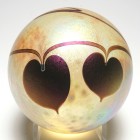 |
| 5968 | Francis Whittemore Miniature Faceted
Pink Crimp Rose Upright Pedestal Paperweight. circa
1970. This miniature upright pedestal paperweight features a
magnificent pink crimp rose with twelve variegated pink petals and
four upturned green sepals. The petals are arranged in
Whittemore's 3+3+3+3 crimp pattern. It is signed on the
underside of the rose with an early Whittemore signature
cane. The signature cane has a black "W" on a yellow
background. The design is set on a clear ground and
supported by a pedestal base. It is faceted with one large
top facet and five side facets. A fantastic addition to any
collection of glass paperweights. Francis Dyer Whittemore, Jr. is considered one of the pioneers of the modern paperweight renaissance. He started working in glass in 1938, originally as a scientific glass maker and instructor in South Jersey. He did not start making paperweights until 1962 when he set up a studio in Lansdale, Pennsylvania. For five years, he spent one month a year consulting at Baccarat to help them refine their lampwork paperweight art. Some sources have this consulting work from 1971 to 1976. Other sources have it starting later. The signature cane used on this paperweight was one he developed prior to working at Baccarat. Most of his paperweights are miniature to medium in size. You can read about Francis Whittemore in the book American Glass Paperweights and Their Makers by Jean Melvin (1970). Miniature size: 1 5/8" diameter by 2 3/16" high. The base of the pedestal has a 1 5/8" diameter. The bottom is ground slightly concave.Signature: Signed on the underside of the rose with an early Whittemore signature cane. The cane has a black "W" on a yellow background. Condition: Excellent condition. No chips, cracks, or scratches found on inspection. For extra pictures, click on the picture at the right and the following links: Large picture$395 postage paid in the US. Click on the picture to see a larger image. |
Click
on the picture to see a larger image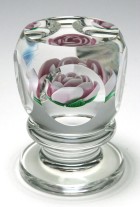 |
Back to Allan's Paperweights (www.paperweights.com)
Revised 1/1/2026 ei9